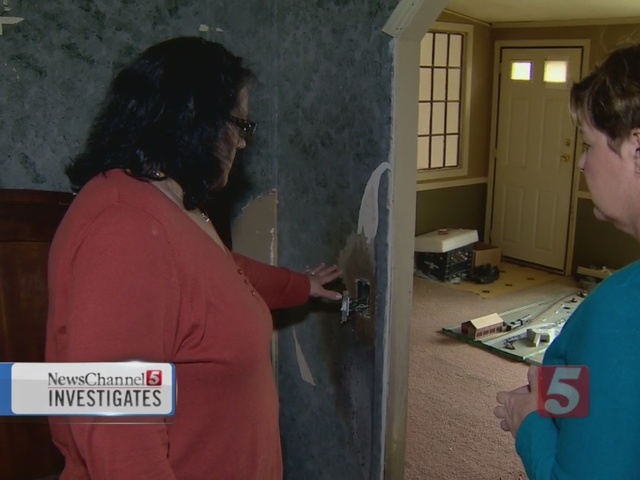What do you do if your landlord won't fix something in your apartment? Or you're facing eviction because you complained about conditions at your complex? Do you have any rights?
Of course, you do. But, there are certain ways, experts say, you need to go about exercising those rights.
When you think of what makes a house a home, broken windows, separated walls, and exposed wires are probably not the things that come to mind.
"When I initially looked at the place, I didn't realize that it was as bad as it was," Jodi Harrington recalled.
Harrington said, days after moving into the house in Watertown, she discovered the breaker for the hot water heater was shut off and covered in blue tape.
"Yeah, it definitely means don't touch it," Harrington explained.
And that is just one of many repairs Harrington said her landlord refuses to make.
"So when you discovered that you didn't have hot water, did he fix it?" NewsChannel 5 Investigates asked.
"No!" she responded emphatically.
"Tenants shouldn't have to live with bad conditions on their property," attorney Zac Oswald stated.
The Legal Aid Society attorney specializes in housing law and said renter have rights. And, whether you're a tenant in an apartment in the suburbs, a high rise downtown or a house in an outlying county, your landlord must make sure your rental is fit to live in and in good repair.
And Oswald says it all should begin with a full inspection with your landlord before you move in and before you sign the lease.
"You want to document everything with pictures preferably, dated pictures and writing those things down and explaining to your landlord that these conditions existed when you moved in," Oswald explained.
Harrington though did not do that.
And, it wasn't until later that she moved items that blocked a wall to find there'd been a fire and the electrical wiring damaged.
"And then I noticed this down here and I was, 'Oh boy!''' she described.
Harrington said she notified the landlord immediately.
But that was 10 months ago.
The Legal Aid's Oswald said landlords have "a reasonable" amount of time to make repairs.
So what is reasonable?
"If somebody has a leaky faucet, a reasonable amount of time could be 14 days. But, if somebody has a hole in the roof or the heat isn't working, certainly a reasonable amount of time is going to be a lot quicker," he said.
And while there are easier ways to let your landlord know about problems you're having like calling or texting, Oswald said the best way to do it is in writing.
"We recommend that they do that in writing so that they can make a list of the repairs that they think are needed, date it and then keep a copy for themselves after they give it to the landlord. Once you have a written paper trail that you have made your requests for this to be done and it hasn't been done, then you should contact a lawyer to start asserting your rights," Oswald told NewsChannel 5 Investigates.
That's what Harrington finally did last month. And when she said the landlord still didn't fix anything, she decided not to pay her rent
But Oswald said, "You should never withhold rent! In Tennessee, the landlord, if you're withholding rent, has the ability to evict you even if repairs are not being made in the property."
And that's exactly what Harrington's landlord now is doing.
"He's taking me to court to evict me," she shared.
And while she hasn't found another place yet, it sure sounds like she's given up on calling this place her home.
"This house is no longer liveable," Harrington sighed.
Harrington said she's also had problems with mold and pests.
Oswald said if you can prove they were there before you moved in, you'll have a much stronger case. If not, look to your lease to see who is responsible for getting rid of those sorts of things.
And speaking of leases, Oswald said a written lease is the most important thing you can have. Make sure you read it and understand it before you sign it.
And if you don't understand it, the Legal Aid Society offer free legal clinics every other week where you can get help.
The Legal Aid Society also has more information on renter's rights on its website. For their free guide click here.



